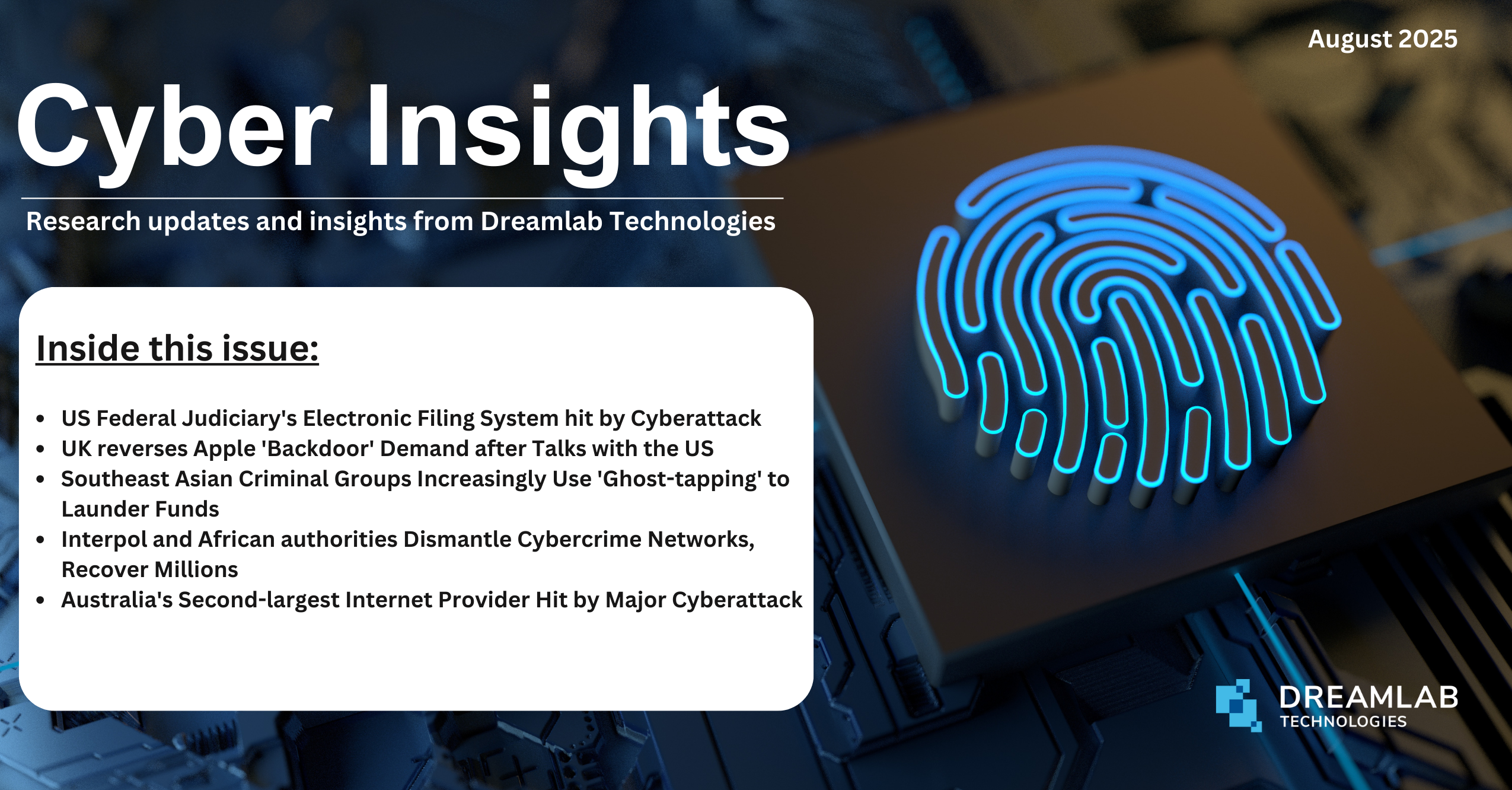
Dreamlab Technologies presents to you our brand new вАШCyber InsightsвАЩ newsletter вАУ an expert analysis of the latest developments in the cyber domain across the globe. The cyber world is a world full of opportunities but unfortunately faces new and emerging threats every day. This newsletter contains insights and trends in cyber security and emerging technologies that will help you stay informed regarding the threats and challenges in today’s rapidly evolving digital world. It also comes with a brief analysis of the cyber security events from a geo-political perspective. In the evolving geo-political dynamics today, cyber security is increasingly being prioritised by countries worldwide. Stronger cyber defence capabilities, higher investments in cyber security budgets and facilitating cyber policy dialogues are some of the new trends observed in the global geo-politics. The concise content in this paper provides a glimpse into this global scenario concerning the cyberspace. It is easy to read and can help promote awareness regarding best cyber security practices and safeguard our digital lives.
Inside this issue:
- US Federal Judiciary’s Electronic Filing System hit by Cyberattack
- UK reverses Apple ‘Backdoor’ Demand after Talks with the US
- Southeast Asian Criminal Groups Increasingly Use ‘Ghost-tapping’ to Launder Funds
- Interpol and African authorities Dismantle Cybercrime Networks, Recover Millions
- Australia’s Second-largest Internet Provider Hit by Major Cyberattack
In this edition, we dive into a series of cyberattacks affecting the U.S. federal judiciaryвАЩs core case management system, potentially exposing sensitive court data across multiple U.S. states. While the identities of the cybercriminals remained unclear, a wide range of threat actors from state-sponsored to organised criminal groups are suspected behind the attacks. The incident underscores the urgency of bolstering cybersecurity measures to protect sensitive judicial data through modernisation of digital infrastructure by adapting to evolving cyber threats, to maintain public trust in the integrity of the legal system.
Next, we examine the UK’s reversal of the order that demanded Apple to build a “backdoor” to enable access to encrypted data of U.S. citizens. The request had sparked concerns regarding individual privacy, as a вАЬbackdoorвАЭ could potentially be exploited by cybercriminals and authoritarian governments across the world, exposing private data and weakening global cybersecurity standards. We study the reversed order, AppleвАЩs ¬†concerns, and the overall impact on iPhone users in UK and the US.
Spanning Asia, we come across вАЬghost-tappingвАЭ, a sophisticated attack technique increasingly used by Chinese-speaking organised crime groups to launder their illicit profits. We explore the attack tactics and technique, and how platforms like Telegram are being exploited to organise such illegal activities. The issue highlights the sophisticated nature of organised crime rising across Southeast Asia including in countries like Singapore, and the increasing need for governments to respond to these evolving threats that stem from fundamental attack techniques like social engineering, phishing, and mobile malware.
In the African region, we delve into Operation Serengeti 2.0, a major operation led by Interpol, coordinated across 18 African countries and the UK, that led to the arrests of thousands of suspected cybercriminals, and the recovery of millions in USD. We study the operation highlights and key successes in dismantling malicious infrastructure, cryptocurrency mining centres and disrupting inheritance scams. The operation highlighted the rising threat of cybercrimes in Africa, and their growing sophistication including AI-driven fraud and InterpolвАЩs crucial role in combating these threats through collaborative efforts.
And across Oceania, we investigate a major cyberattack that hit Australia’s second-largest internet provider, compromising the personal data of hundreds of thousands of customers, potentially accessed by an unknown third party. The breach impacted the internet providerвАЩs order management system used for creating and tracking broadband connections of customers. We examine the attack technique and the possible implications of the breach. The incident yet again serves as a stark reminder of the vulnerabilities faced by even the most prominent companies in the digital age, causing potential risks to both businesses and customers, urging for robust cybersecurity protocols and a more resilient infrastructure.


